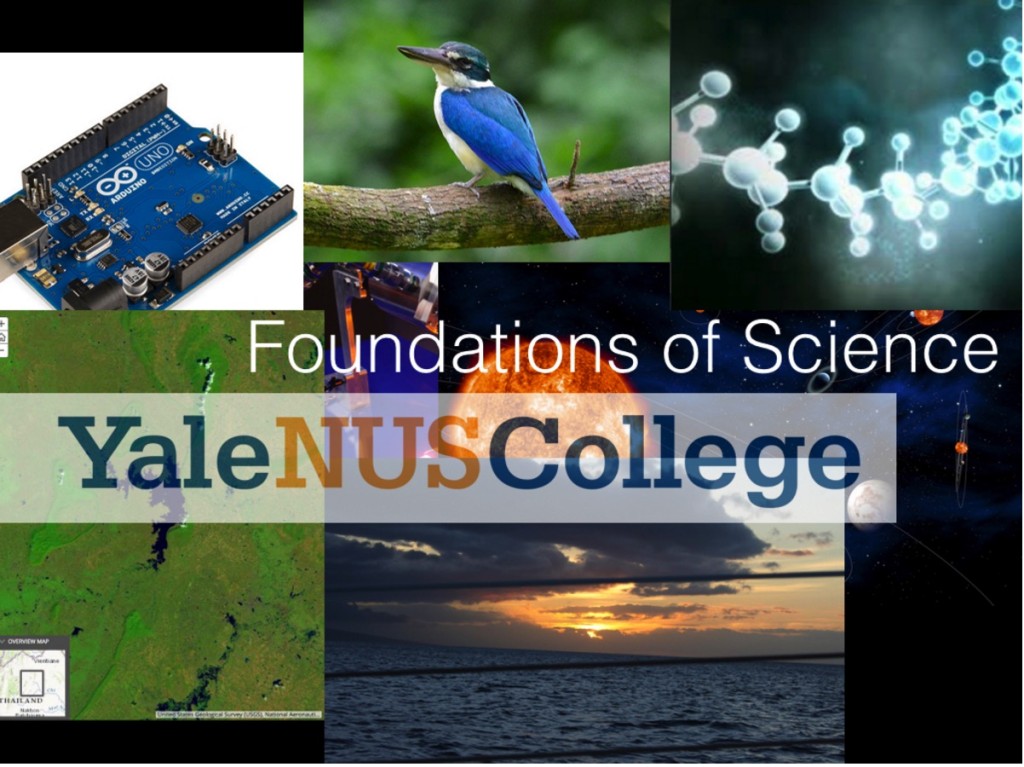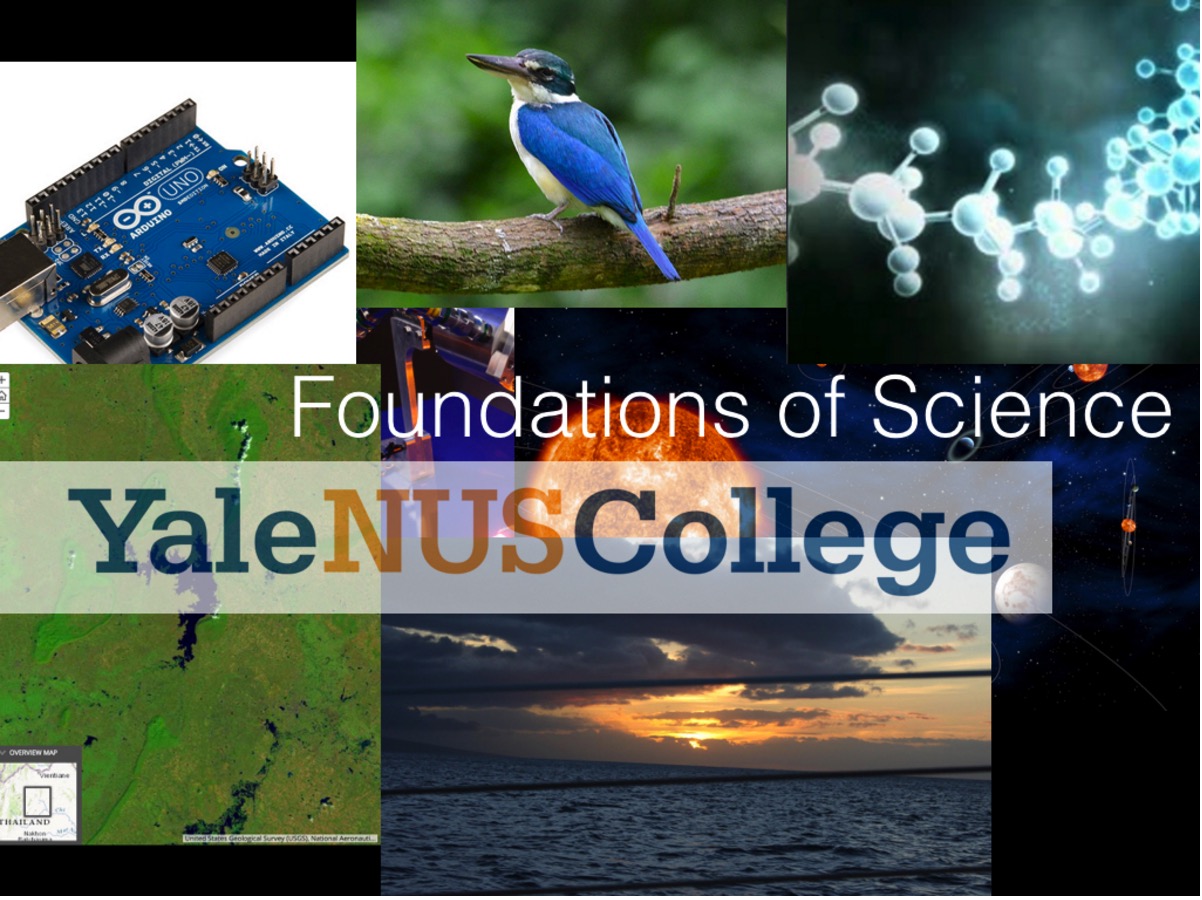We have launched a new semester of Yale-NUS College’s Core Curriculum Science course, Foundations of Science! This is the third offering of Foundations of Science, which has evolved from a two semester course taken by just non-science majors, into a more intense one-semester immersion into science taken by all of the Yale-NUS sophomore students. The changes in the course this year include a new alignment of the ten disciplinary units along the lines of “modes of inquiry.” All of our Yale-NUS College students will take two short courses in disciplines, known as “disciplinary case studies.” Our teaching team of 10 faculty are offering an exciting lineup of courses that include a unit on exoplanets (using a remote telescope in Chile), biogeography (using camera traps and tracking animals in Singapore), ornithology (with frequent field trips to wild spots across Singapore), molecules of life (using a brand-new NMR machine to measure reaction rates), water (with a lab that includes student-build water purification), networks (with simulations of complex networks in a variety of contexts), and electronics (where students build and program small computers known as Arduinos. These disparate units are all unified by providing the same modes of inquiry. Half of the units are designed to provide experience with Observation and Geospatial Mapping, while the other half include training in Experimentation and Mathematical Modelling. The goal of the course is to provide all the students one unit which teaches them how to conduct field observations and mapping, and to design a research project in observational science, and a second course in laboratory science where students can perform exacting measurements, and use mathematical modelling to verify their experimental results. The course also opens up with a reading and discussion of the book Ignorance: How it Drives Science by Stuart Firestein. The goal of this “framing” reading is to emphasize to the students that authentic science is about developing questions and encountering the boundary between known and unknown – the liminal space in which a scientist is able to fully engage both their creativity and deep disciplinary knowledge. Our goal is to have our Yale-NUS College students experience this more authentic type of science – and so far the course is starting off well!

You can read more about this exciting new format for Foundations of Science at our course web site – http://fos1aug2016.courses.yale-nus.edu.sg/ . Below is a short excerpt from the web site.
Foundations of Science at Yale-NUS College – Fall Semester 2016
Students will select two disciplinary mini-courses that are designed to provide a “deep dive” into science with an authentic learning environment that empowers students to observe, map, experiment, and model nature using the latest scientific techniques. Each mini-course, lasting for 6 weeks, will follow a common schedule, assessment scheme and grading methodology. The students will be able to choose among our group of 10 mini-course offerings, and they will complete one mini-course in each of the two modes of inquiry. In each mini-course they will learn the experimental techniques and disciplinary background for a particular subject, but will share a common experience of developing through their own work a first-hand knowledge of the methods of inquiry used in science, and as described in our initial Yale-NUS Course Scientific Inquiry. By the end of the course students will be able to have advanced understanding of two scientific disciplines and experience with a set of four modes of inquiry common in science. The experience of Foundations of Science will prepare students to engage substantively on the profound scientific and technical challenges facing our planet, whether or not they major in scientific disciplines.
FOS Facilitator and Email: Bryan Penprase, bryan.penprase@yale-nus.edu.sg
Class Location and Time: M/Th – 1:00-2:30 or 2:30-4:00; (10 sections)
Learning Goals
- Disciplinary Knowledge: demonstrate a systematic or coherent understanding of an academic field of study
- Critical Thinking: apply analytic thought to a body of knowledge; evaluate arguments; identify relevant assumptions or implications; formulate coherent arguments
- Communication Skills: express ideas clearly in writing; speak articulately; communicate with others using media as appropriate; work effectively with others
- Scientific and Quantitative Reasoning: demonstrate the ability to understand cause and effect relationships; define problems; use symbolic thought; apply scientific principles; solve problems with no single correct answer, apply mathematical models to data, and use statistical analysis to provide hypothesis testing with quantitative data.
- Self-Directed Learning: work independently; identify appropriate resources; take initiative; manage a project through to completion
- Information Literacy: access, evaluate, and use a variety of relevant information sources
- Engagement in the Process of Discovery: students will demonstrate the ability to work productively in a laboratory setting, studio, library, or field environment, and to produce excellent laboratory reports and field reports.
Disciplinary Mini-Courses and Modes of Inquiry
Within Foundations of Science, students will choose two disciplinary mini-courses, one from each of our two groups (Group A and Group B) which sample different modes of inquiry. The titles and subjects of these mini-courses are described below. Additional mini-courses will be added closer to the beginning of the semester.
Group A – Modes of Inquiry: Observation and Geospatial Mapping. In this group of mini-courses students will observe nature carefully – either with field biology or astronomy, and conduct their own mapping exercise using GIS or astronomical coordinates.
Section 1: Finding a Habitable Planet – 1:00-2:20PM – Classroom 17
Instructor: Bryan Penprase
Section 2: Island Biogeography – 2:30-3:50PM – Classroom 17
Instructor: Jennifer Sheridan
Sections 3 and 4 : Field Ornithology – 1:00-2:20PM and 2:30-4:00 – Classroom 18
Instructor: Vinod Saranathan
Section 5: Plant functional traits
Instructor: Michiel van Breugel – 2:30-3:50 – Classroom 20
Group B – Modes of Inquiry: Experimentation and Mathematical Modeling. In this group of mini-courses students will conduct their own laboratory experiments and model theoretical quantities mathematically, comparing data with theory.
Sections 6 and 7: Molecular Perspectives
Instructor: Stanislav Presolski – 1:00-2:20 and 2:30-3:50 – Classroom 19
Section 8: Hardware and Software Programming for Interactive Systems Instructor: Simon Perrault – 1:00-2:20PM – Classroom 20
Section 9: Water and Its Interaction with The Environment
Instructor: Kiat Hwa Chan – 1:00-2:20PM – Classroom 21
Section 10: Networks
Instructor:
Maurice Cheung – 2:30-3:50PM – Classroom 21
Pedagogy
The Foundations of Science will employ a number of research-validated pedagogies, including active learning, experiential learning, project-based learning, and case studies. The course will devote considerable time toward enabling students to conduct their own observations, experiments, models and maps, to enable deeper and more meaningful learning.

